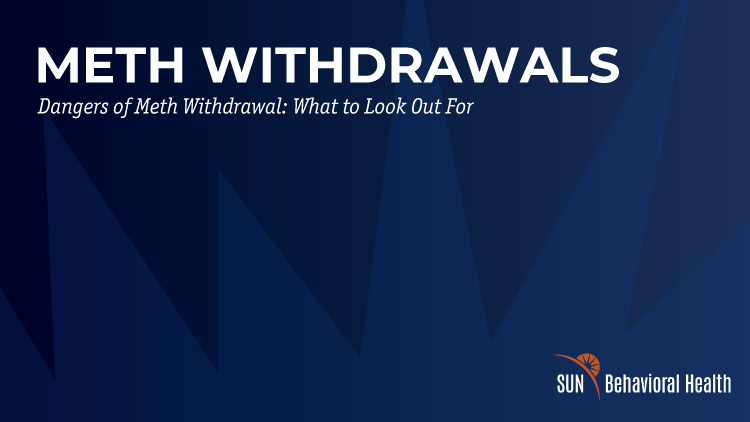Services
- Home
- Mental Health
- Who We Treat
- How We Treat
- Patients & Visitors
- About
- Lexington
close

A young man had experienced anxiety for most of his life. When he brought it up at work once, a colleague introduced him to methamphetamine. They informed him that meth would help his anxiety and allow him to be more focused on their tasks. At first, it seemed as if his colleague was right, but he eventually noticed that his anxiety was worsening. He couldn’t remember the last time he properly ate something, and the weight loss he experienced was beginning to worry him. He decided it was best to stop taking methamphetamine but faced more symptoms, such as intense cravings and depression. He was experiencing meth withdrawals.
In Kentucky, 50,000 people used methamphetamine in 2021. Although not everyone who used the substance developed a meth use disorder, it is possible many experienced some form of meth withdrawal when they stopped. For those who only took meth for a short time, their symptoms were most likely mild compared to someone who had been managing a meth use disorder for several years.
SUN Behavioral Health Kentucky solves unmet needs in our community. We have 24/7 crisis care that allows people to begin their meth use disorder treatment when they decide to seek help. Withdrawal symptoms can make it challenging to wait for treatment to become available often resulting in people changing their minds before their appointment comes. Our crisis care allows you to get the help you need at the moment you decide to seek treatment, eliminating the potential for changing your mind.
Today we’re going to look at meth withdrawals, the symptoms that come with it, and what steps you can take to overcome it.
So, you’ve decided to stop taking meth and begin a path toward recovery. Within the first 24 hours, you start to feel uncomfortable. Why is that? What causes withdrawal and how can you know when it’s happening?
Over time, continuous meth use increases the probability of developing a meth use disorder. Your brain and body begin to adapt to the substance, which can result in a perceived reliance on the effects that it brings. This reliance occurs because meth can temporarily alter brain chemistry, such as the dopamine and serotonin centers in your body. These chemical messengers can impact mood and sleep.
However, when someone stops taking methamphetamine, it leaves your system having to adjust to the loss of the substance. Which, in turn, starts meth withdrawal symptoms as your body recovers from the long-term presence of meth in your system. These symptoms are temporary, and the brain can return to normal with time and treatment.
Most of the time, meth withdrawal is not dangerous. However, symptoms of withdrawal can result in complications that a medical professional should address. For example, severe depression may result in thoughts of suicide. Psychosis is also a common side effect of meth withdrawal and is best treated with the help of medical professionals. If you have been taking other substances alongside meth, it is essential to consult with a medical professional before stopping all substances, as the withdrawal symptom combination can be dangerous. These substances could include alcohol, benzodiazepines, and more. Some other symptoms that warrant the need to have a professional monitoring include trouble concentrating, paranoia, changes to your speech, and anxiety.

There is a myriad of symptoms you can experience when you're going through meth withdrawal. Substance use of any kind impacts nearly every corner of the body, leading to a wide variety of potential withdrawal side effects. Let’s take a closer look at the physical and psychological impact that meth withdrawal can have.
Various psychological symptoms accompany meth withdrawal. However, different people may experience different symptoms. Just because someone had one set of psychological symptoms doesn’t mean you will have the same combination. Some people may experience severe depression or anxiety, while others may have paranoia or hallucinations. Others may experience agitation. In severe circumstances, people might experience psychosis.
It is important to remember that these symptoms will not last forever and will improve with time. Mostly, the symptoms will be the worst within the first 24 hours before showing improvement. However, symptoms like depression may last a few months.
Likewise, there are several physical symptoms people may experience when they have stopped taking meth. These symptoms can range in severity. Some symptoms people may experience include dry mouth and headaches. Other people may experience muscle spasms as a result of stopping their meth use.
Many people can expect to experience fatigue, excessive tiredness, and disturbed sleep. Not only can meth withdrawals impact your sleeping habits, but it may also impact your eating habits.
Changes in appetite and sleep occur once you have stopped using meth because it is a stimulant. When you are taking a stimulant, it can result in a loss of appetite and wakefulness. So the moment you decide to stop taking meth, your body begins to return to normal, which can result in excessive fatigue and an increased appetite.
When it comes to psychological symptoms, see a medical professional if symptoms worsen over several days.
For most people, the highest level of symptom intensity following your final dose of methamphetamine is 24-48 hours. Most people's symptoms will go away within 7-14 days. Symptoms such as depression, anxiety, and sleep concerns may last longer. Ultimately, everyone is different, so no two people will experience the exact same timeline as someone else.
In rare cases, psychological symptoms of meth withdrawal can last for several months. Just know that there is an end to the side effects of meth, and recovery is still possible even if you experience symptoms of withdrawal.
Yes, it is possible. A medical detox program consists of a person being in a medical facility where they can be supervised during the detox process. Detoxing is the natural process that occurs during withdrawal where the body rids itself of the substance. By doing this process in a medical facility, you can ensure that medical staff will help you should any complications arise. They will also help ensure your comfort during withdrawals, too.
Remember, recovery happens every day. One way people do find help when it comes to their recovery is by attending treatment for a meth use disorder which can involve cognitive behavioral therapy (CBT)— this type of therapy results in patients learning skills and techniques necessary for managing symptoms of withdrawal. Receiving treatment for meth use can also prevent a return to use after you have stopped using the substance, which can allow for long-term recovery.

If you have been managing a meth use disorder for some time now, it might feel like the symphony of your life is no longer harmonious. Perhaps, your meth use disorder has resulted in the parts of your life clashing and falling apart around you, and you don’t know how to put it back together. By seeking meth addiction treatment, you can learn the skills and techniques that are necessary to assist you as you are recreating the symphony of your life through recovery. These skills and strategies can help you avoid a return to use and make it easier to manage lingering symptoms of meth use disorder withdrawal.
At SUN Behavioral Health Kentucky, we solve unmet needs in the Erlanger, KY community. We do this by offering treatment for both adolescents and adults. Should you have any questions you wish to address or seek further information, please don’t hesitate to contact us at 859-429-5188.